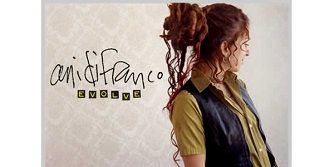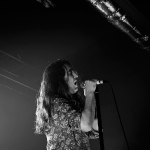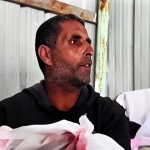Ani DiFranco Talks About EVOLVE
Why did you call the album EVOLVE?
The album is named after one of the songs on it and I guess I felt that the song “Evolve” epitomized or encapsulated a lot of the album’s central themes. It was the last song to be recorded, as it is one I wrote while I was down in Texas mixing the others. It represents my state of mind at the end of the whole process of writing, performing, recording and mixing this body of work. The record is richly mixed, but retains the loose, joyous feel of a live show.

What contributed to that feeling?
Live in-studio recording with a minimum of overdubs. Of course the ’studio’ in most cases was my house in Buffalo, so tracking the whole band at once meant using absolutely every microphone and room available. We had the joint jumpin’…poor kitties!
Your last album was released in September 2002; was this new one recorded in the short time since SO MUCH SHOUTING, SO MUCH LAUGHTER came out?
No, I worked on the two records concurrently, which is to say over the course of a year, in between tours.
You’ve included studio versions of “Shrug” and “Welcome To:” which made their debut on your last live album. Why?
“Shrug” and “Welcome To:” are simply of this body of songs, but happen to appear on the live album first. Why are they on the live album? I don’t know. Why not?
Your growth as a producer is very much evident on this record. How have you evolved as a producer?
After making 25 records or so (most of them mine) I have slowly developed a recording aesthetic, and the skills to realize it. I worked with many engineers in the tracking of these tunes, but then went and mixed them by myself down at the Congress House. It was arduous mixing alone, but liberating to know that I am indeed capable of being my own engineer. It was really this self-sufficiency of being my own engineer that was exciting and challenging for me this time around. Being a producer (i.e. guiding an album conceptually) is more old hat.
The new album really showcases your touring band (as did the last two), but your recent live shows have been solo. What has that transition been like for you?
Wonderful. I learned a lot from working with the band the last bunch of years, especially in terms of arranging. But it was also amazingly distracting and exhausting, so now I am back to being a lone folksinger. I got to the point where I was weary of thinking about what five other people should be doing all the time, and I just wanted to play. And though I have lost the company of some dear friends, I feel in a way that I have myself back, and my work has become much more gratifying to me as a result.
From your earliest album to the current one, your songs have made the personal political and vice versa. Has your understanding of those realms - ‘personal’ and ‘political’ - changed (okay, evolved) over the years?
Since political edifices are purporting to dictate to me, whether I can or cannot have an abortion, what drugs I can or cannot ingest, where on this earth I can and cannot go, and who on this earth I can love (just to name a few things), then it seems obvious to me that the personal is political. This has always seemed obvious to me. Conversely, once you understand yourself to be connected to all other living things, and the earth beneath your feet, you respond to the oppression of people and the destruction of the environment by governments by taking it personally. It is the latter half of this equation that I am developing as I journey into adulthood and therefore into a position of responsibility and/or accountability to human society. It is an equation that always adds up to one, however. The personal and the political are of one realm; to separate them is artificial.
You’ve called EVOLVE your favorite of your albums, and you’ve talked about creating your own genre of music on it. Can you elaborate on that?
Oh my god, doesn’t that sound pompous?! Well, yes, EVOLVE is my favorite of my records, mostly because it ain’t out yet! [laughs] I always like the new record best, because it represents my most recent accomplishments, but in the end, of course, I loathe them all. There are some very positive things that this album represents to me, though, for sure. There’s the self-sufficiency I spoke of earlier, and also in terms of ‘creating my own genre’ or whatever, I think EVOLVE is an album spoken by my band in our own language. One we spent years developing. Three years ago, when I added the horn section to the group, I suddenly found myself and my songs surrounded by a bunch of musicians all looking at me going “OK, so what do we do?” And though I had no idea myself, at first, I had to keep answering that question every day, every new song. I think that EVOLVE represents the culmination of a lot of work honing in on the musical aesthetic, which guided that collective.
Was the song “O My My” written on the piano instead of the guitar?Why did you choose to play the song yourself instead of having Julie play it?
I wrote “O My My” on the piano to challenge myself, because I can’t actually play piano at all! Having Julie, who plays piano very well, play it for me would defeat the purpose, now wouldn’t it? Besides, I always prefer to hear musicians taking chances, than to hear them playing it safe and getting it right all the time.
“Here For Now” has a strong Latin feel to it. Did you set out to write a song with that distinctive rhythm, or did the lyrics lead you to it?
Neither. That’s just what my hands started playing on the guitar, which was naturally influenced by what I was listening to at the time. Listening, that is, by choice, and also by default, since Latin pop artists were dominating the requisite Top-40 soundtrack to all public spaces. I was in a bar in Copenhagen when I first made up the main guitar riff. I remember it because I was walking around the venue all day, with my Backpacker guitar slung over my back, just riffin’ on it.
EVOLVE is the final recording with this group of musicians who you worked with for so long. Is it the definitive statement of this stage of your career?
Yup. I would say so, and now as is my wont, I am someplace else entirely. I imagine when I put a band together again in the future, it will be a much different beast.

How important was your band in realizing the melodies you wished to create, and expanding the harmonies you heard in your head?
When musicians hang out together, they expose each other to music, artists, and recordings that they would not necessarily have come across on their own. They expand each other’s universes in this way. Each of us has a unique musical history, which has taught us unique things, and when we come together we pool this knowledge. We play records for each other, we talk shop, we listen together to the world around us. Then of course, there are the long hours spent playing together. How important was my band to me? As important as any of my near and dear, my comrades, my friends. I think you can imagine.
Let’s talk about some specific songs - either the stories behind the writing of them, or the stories behind recording them: “Promised Land”?
“Promised Land” is simply a conversation between two women. Both those women happen to actually be me, but that’s beside the point.
“Serpentine”?
“Serpentine” is basically a long poem that I spent months and months writing. It was a real doozy to record, because there is so much to it, and it is so spare and exposed. I recorded it a bunch of times, but found that over the course of its ten-minute recitation, I was only ever happy with five or so of those minutes. I experimented with splicing takes together, but in the end, decided it was more important to go with one performance, than to achieve some kind of perfection or composure in every moment. At the end of that performance that appears on the record, I cried and cried. So I figured, ‘fine, I guess that’s it.’
Interview by Joe Sweeney February 5, 2003
|
|

|

The Answer |
LATEST GALLERY IMAGES

The Price of Food 
The Invisible Enemy |
|
|

